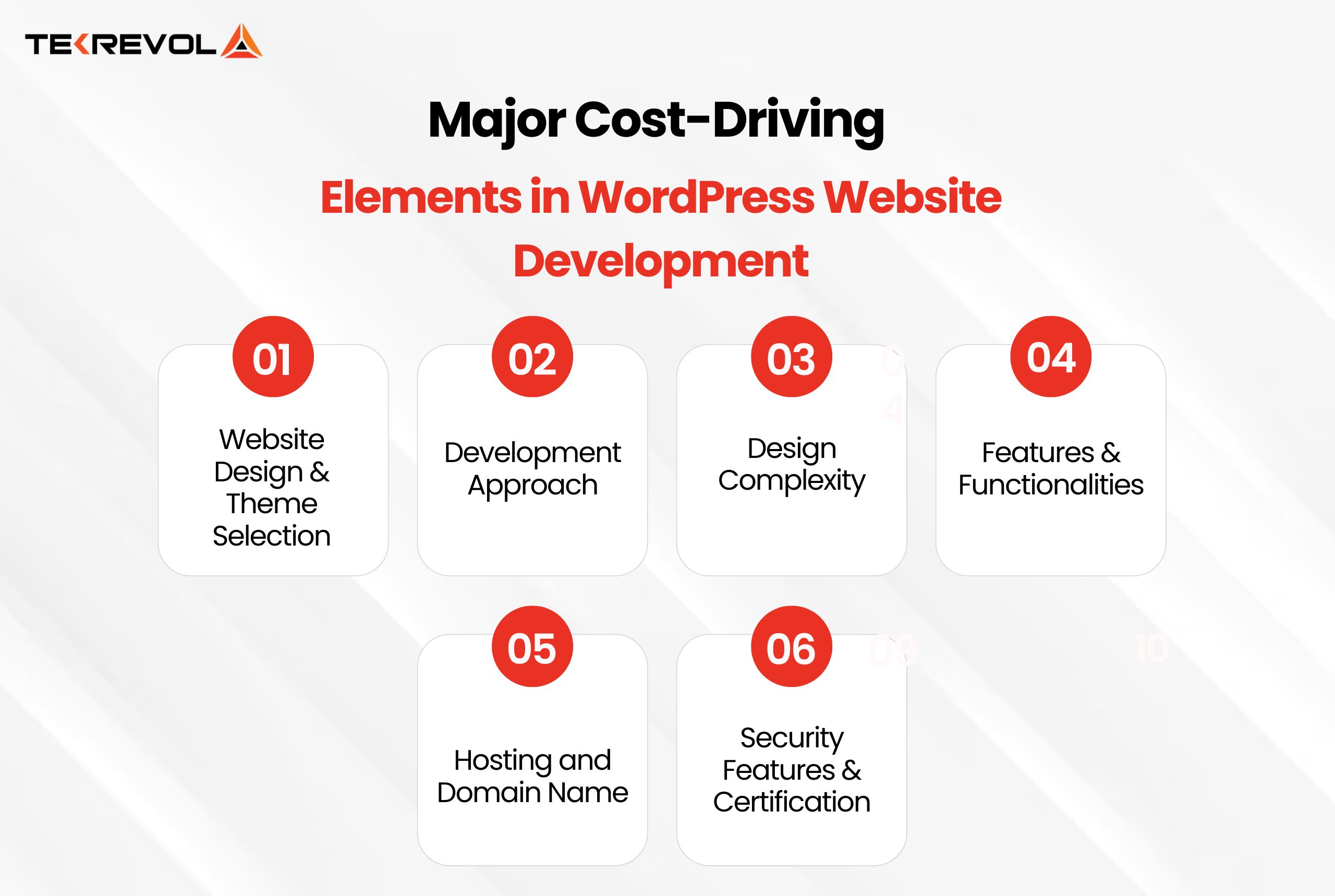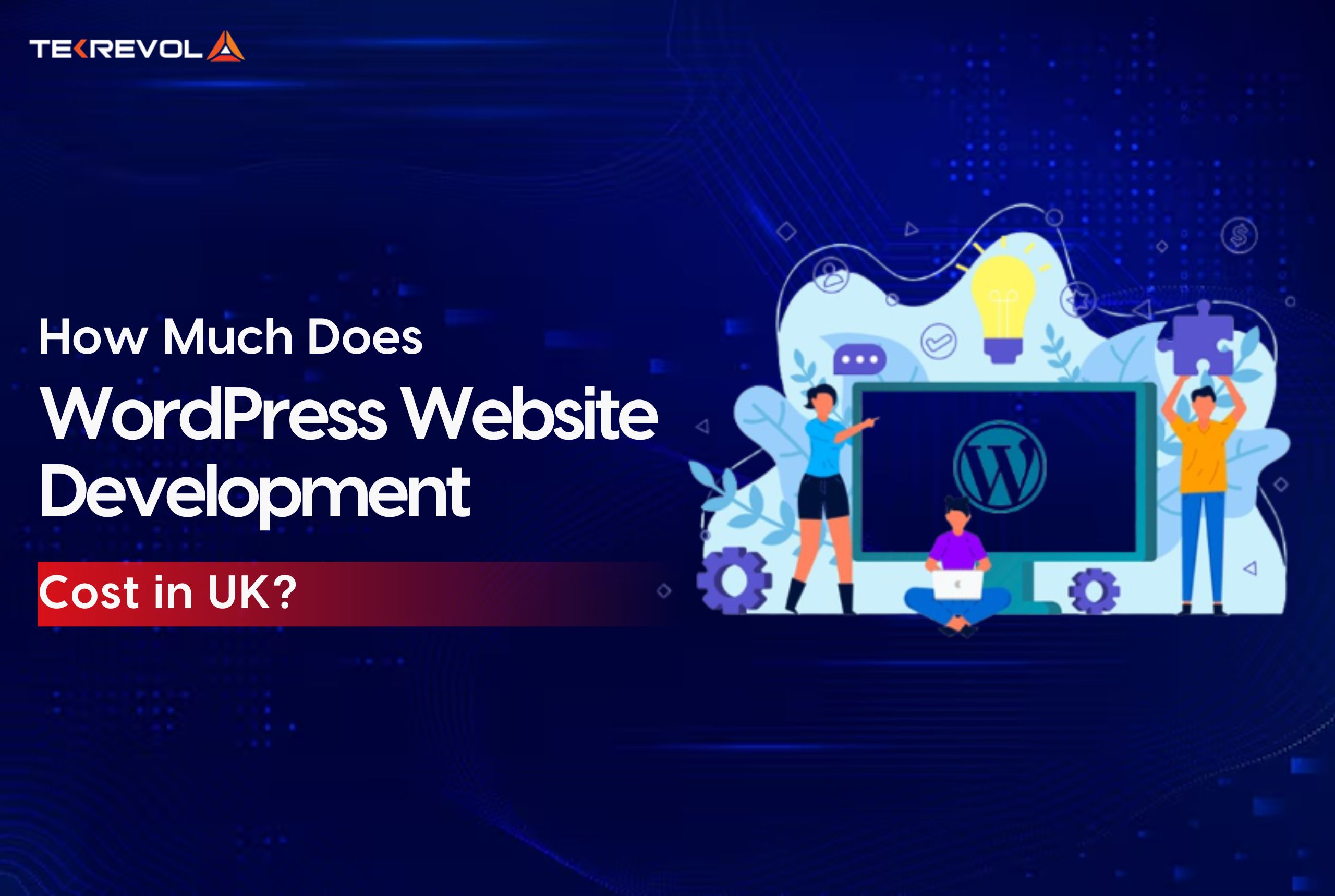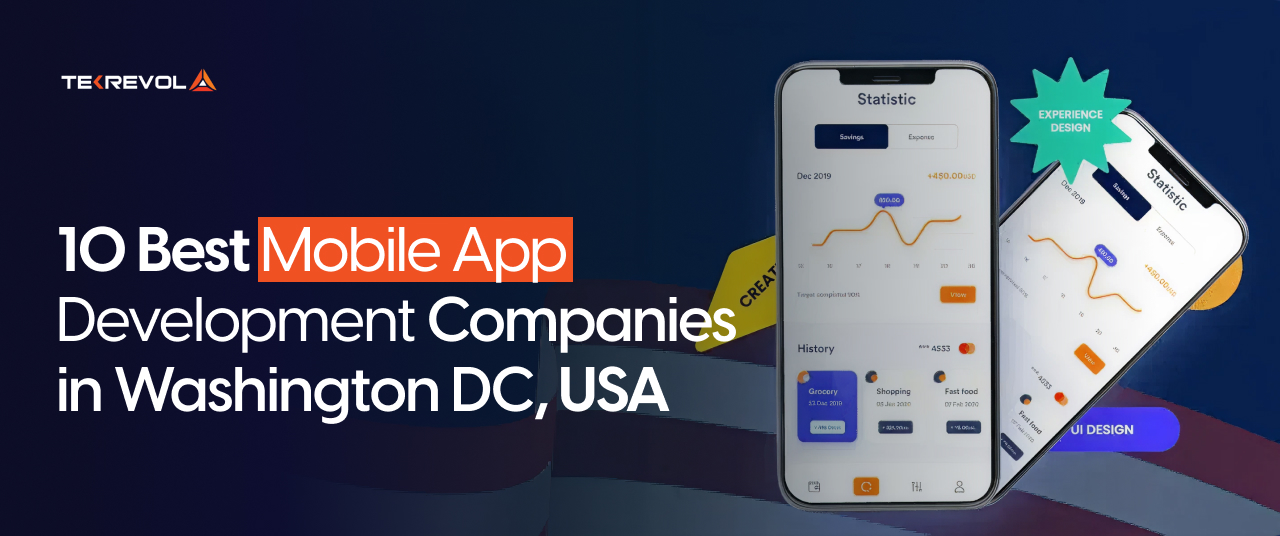When exploring WordPress website development cost in the UK, you’ll find pricing all over the map, from budget-friendly quotes to premium packages costing thousands. The truth? There’s no one-size-fits-all price tag. Your final cost depends on what you actually need.
Globally, WordPress drives over 43% of websites, including a vast number of UK startups, SMES, and enterprise-level companies.
Depending on your project’s complexity, a WordPress website cost in the UK is anywhere from £500 for a simple build to over £30,000 for a fully custom eCommerce solution.
In this blog, we’ll walk you through the cost of a wordpress website, reveal potential hidden fees, and show you how to make every pound count when building your WordPress site development.
- Need a Custom WordPress Solution?
- We help you create a fully functional, responsive site from design to launch.
Why WordPress? A Quick Look at Its Popularity
Let’s begin at the beginning. Why is WordPress so widely used?
- 43% of all websites worldwide are run on WordPress (Source: W3Techs).
- With tons of themes and plugins, many of them free.
- WordPress is quite customizable and user-friendly for blogs, business sites, portfolios, e-commerce sites, etc.
- It is SEO-friendly, open-source, and backed by numerous developers and agencies in the UK.
Average WordPress Website Costs in UK
Wondering how much to budget for your WordPress site? Whether it’s a personal blog or a full-scale ecommerce store, WordPress can do it all, but costs can vary based on your needs.
To give you a clear picture before you dive in, we’ve broken down typical WordPress development costs and timelines by project type.
| Website Time | Development Time | Estimated Cost |
| Basic Blog or Personal Site | 1-2 weeks | £300 – £1,000 |
| Startup or Brochure Website | 2 – 4 weeks | £1,000 – £3,000 |
| Small Business Website | 3 – 6 weeks | £2,500 – £5,000 |
| Corporate/Custom Website | 6-12 weeks | £5,000 – £10,000 |
| eCommerce (WooCommerce) | 6 – 10 weeks | £7,000 – £15,000+ |
| Enterprise or Scalable Site | 8 – 12+ weeks | £15,000 – £30,000+ |
Note: These are approximate ranges and can vary based on functionality, design complexity, and developer rates.
Major Cost-Driving Elements in WordPress Website Development

WordPress website development in the UK can be hugely different in cost, and the ultimate price hangs significantly on the scope and extent of your project. From your design tastes to the development path you take, several factors are at play. Let’s break down the main aspects that affect the overall cost.
1. Website Design and Theme Selection
Your website’s visual appeal tends to start with choosing the correct theme or having a custom design. You have free and premium themes, but choosing to have a completely customised design specific to your brand can be an added expense.
Pre-built themes: Usually cheap or free
Custom design: Anything from £500 upwards to well over £ 120,000, depending on how complex it is and who you commission (freelancer, website development agency, or internal team)
2. Development Approach
How you go about building your WordPress website has a significant influence on the overall cost. Here are three typical pathways:
Freelancers
Best for tiny sites or straightforward functionality.
- Cost Range: £500 – £5,000
- Pros: Cost-effective, adaptable
- Cons: Quality management, restricted scalability
In-House Development
Ideal for large businesses wanting full control over their website development.
- Cost Range: £50 – £120,000
- Pros: Complete control, extensive customisation
- Cons: High expense (salaries, training, equipment)
WordPress Website Development Agencies
Most popular for mid-size to large businesses looking for quality and support.
- Cost Range: £3,500 – £150,000
- Pros: Expert design, ongoing support, faster turnaround
- Cons: Higher upfront cost compared to freelancers
Tip: For long-term growth, a WordPress development company is the best balance between quality and cost.
3. Design Complexity
The complexity of the desired design is another key area that affects expenses on WordPress websites. The way the page looks is not just an aesthetic aspect, because it affects the way users interact, search, and utilise the site on different devices.
A more intricate design requires more effort and skill to accomplish, which ultimately increases the overall cost of a project. Here’s a structured breakdown of how design complexity typically impacts WordPress website pricing:
Simple Design
- Clean, minimal layout with basic elements and a standard page structure.
- Often uses pre-built themes with light customisation.
- Suitable for personal blogs, basic service websites, or portfolios
Time required: 20–40 hours
Estimated cost: £500–£1,000 (based on £25–£50/hour)
Moderate Design
- Includes some custom visuals, flexible layout options, and customised branding
- May involve light animation or added content blocks
- Fits well for small businesses or startups with growing content needs
Time required: 40–80 hours
Estimated cost: £1,000–£2,000
Complex Design
- Custom user interface with advanced visual elements and interactive features
- May involve tailored page templates, animation effects, and performance optimisations
- Ideal for mid-sized businesses, marketing campaigns, or content-heavy websites
Time required: 80–120 hours
Estimated cost: £2,000–£3,500
Very Complex Design
- Fully bespoke design crafted from scratch with multiple interactive components
- Includes user journey mapping, mobile-first responsiveness, and high-level branding
- Often requires collaboration between UI/UX designers, developers, and strategists.
Time required: 120+ hours
Estimated cost: £3,500 and above
Note: These are general estimates. Actual costs may vary based on your specific requirements, the number of revisions, and the experience level of the designer or agency you work with.
4. Features & Functionalities
WordPress, in its default state, refuses to offer anything beyond the bare essentials to build a basic website. Adding features is imperative for most websites to be different and cater to specific business objectives. These add-ons, be they functional, interactive, or design-oriented, introduce scams of extra development work, a third-party service, and, of course, licenses for plugins. With this, naturally, comes the increasing cost of the entire website.
The thing to keep in mind is that even the tiniest of modifications could necessitate subsequent implications for design, testing, and maintenance. Below is a simple breakdown of what those commonly requested features are, how much value they have, and how their presence will affect pricing for the project:
| Features | Description | Estimated Cost |
| Custom design | A fully tailored UI/UX that aligns with your brand identity, requiring bespoke design and front-end coding. | £1,000 – £5,000+ |
| Responsive Design | Optimisation for seamless performance across desktops, tablets, and smartphones. | £500 – £1,500 |
| Payment Gateway Integration | Enables online transactions through services like Stripe, PayPal, or Square. | £50 – £200 |
| Shipping Integration | Real-time shipping rate calculations and tracking integrations with carriers like DHL, FedEx, or Royal Mail. | £50 – £200 |
| Product Reviews & Ratings | Let customers submit feedback and rate products, increasing trust and engagement. | £50 – £150 |
| Live Chat or Chatbot | Embeds support chat or AI-based bots to handle customer inquiries and improve UX. | £100 – £1000 |
| Multilingual support | Enables language switching to cater to international audiences; often includes SEO for each language. | £300 – £1,000+ |
| Multi-Currency Functionality | Using real-time exchange rates, automatically displays product prices in the user’s local currency. | £150 – £500 |
| Advanced product filters | Adds layered navigation with filters by price, colour, brand, and more—vital for large catalogues. | £200 – £600+ |
| Inventory Management System | Tracks stock levels, automates reordering, and integrates with suppliers—especially useful for eCommerce. | £300 – £1,200+ |
| Email Marketing Integration | Connects to tools like Mailchimp, ConvertKit, or Klaviyo for automated email campaigns and subscriber management. | £100 – £400 |
| Social Media Integration | Auto-sharing, login via Facebook/Google, embedded feeds, and social proof elements. | £50 – £250 |
| Analytics & Tracking Setup | Implements Google Analytics, Facebook Pixel, or Hotjar for monitoring user behaviour and performance. | £50 – £200 |
| Third-party API Integrations | Connects your website to CRMS, inventory systems, payment tools, or marketing platforms through API connections. | £300 – £1,500+ |
| Push Notifications | Sends real-time updates or promotions directly to users via their browser or device. | £100 – £400 |
5. Hosting and Domain Name
Before your WordPress website goes live, there are two critical elements needed: a domain name and a hosting service. The domain is the address of your website on the web (such as yourbusiness.co.uk), and hosting is where all your website’s data resides. These are basic costs for any WordPress site.
Here’s a rough outline of typical costs in the UK:
Domain Name
- What It Is: Your website’s identity on the web.
- Cost Range: £7 – £20 annually (variable with registrar and extension)
- Popular Extensions:.co.uk,.com,.org,.net
Tip: Purchasing a domain name for several years or through a hosting provider typically offers discounts or trials for free.
Web Hosting Options (UK Pricing Overview)
| Hosting Type | Monthly Cost | Best suited for |
| Shared Hosting | £2 – £6 | Small blogs, personal websites |
| VPS Hosting | £8 – £30 | Medium-sized business websites with moderate traffic |
| Dedicated Hosting | £50 – £200 | Large enterprise websites with high traffic |
| Cloud Hosting | £10 – £40 | Startups and scalable app-based platforms |
| Managed WordPress Hosting | £20 – £100 | WordPress-specific performance, updates & security |
Performance Tip: Managed WordPress hosting may seem pricey, but it saves time and boosts performance for serious business sites.
Hosting Providers & UK Pricing
- Bluehost – From £2.22/month
Includes free domain (1st year), SSL certificate, 50GB SSD, and easy WordPress setup.
- HostGator – From £2.75/month
Offers free domain, unmetered storage/bandwidth, and 1-click WordPress installs.
- SiteGround – From £5.99/month
Comes with 10GB storage, daily backups, strong security, and unlimited bandwidth.
- A2 Hosting – From £2.99/month
Known for fast speeds, free site migration, SSD storage, and performance features.
- InMotion Hosting – From £2.99/month
Gives unlimited storage, a free domain, an SSL certificate, and built-in marketing tools.
- WP Engine – From £22.50/month
Premium managed WordPress hosting with daily backups and high-speed performance.
- DreamHost – From £2.44/month
Unlimited storage and bandwidth, free domain, and 1-click WordPress installation.
6. Security Features & Certification
Ensuring that security exists is not optional in the process of constructing a WordPress site. By protecting your site, you protect user data, support trust with visitors, comply with obligations such as GDPR, and possibly even improve your SEO performance.
The following are the most important security features you should include in your development plan, along with their average costs:
| Security Feature | Cost | Description |
| SSL Certificate | Free – £300/year | Encrypts user data (look for HTTPS). Often free with hosts. |
| Security Plugins | £0 – £150/year | Plugins like Wordfence, Sucuri offer firewalls and scans. |
| Vulnerability Testing | £300 – £1,000 | Manual or automated penetration testing for larger sites. |
| Backup Systems | £0 – £200/year | Crucial for disaster recovery. Services like VaultPress or UpdraftPlus help here. |
- Planning Your WordPress Website?
- Discuss your project details with our experts to get a precise estimate or use our cost calculator.
WordPress Website Development UK: Unexpected Costs to Consider
There are quite a few hidden costs involved in the development of a WordPress website, and it is a long and cumbersome venture, but neat and clean. These tend to be a prerequisite for your project, and you should consider them early on. Now let’s check out those costs that are usually not noticed:
1. Premium Themes and Plugins
WordPress has a vast collection of free themes and plugins, but when it comes to working, a lot of businesses will advocate using premium themes and plugins for the extra dose of advanced features, security, and support.
Most of the time, premium themes offer more flexibility to design them, while premium plugins often serve the purpose of powerhouse functionality in SEO, security, eCommerce, and more.
- Costs for Premium Themes: From about £40-£200 what one expects to pay for a premium theme. Better customizability, built-in support, and regular updates accompany premium themes.
- Cost of Premium Plugins: Plugins can range from about £30 to £300 and sometimes higher, depending on what they offer; for instance, premium plugins include payment gateways, advanced SEO, and enhanced security measures.
- Bundling Prices: This is in addition to several copycat products where theme and plugin developers use to market them as bundles. This can cost anything between £100 to £1,000 for an access point through which the user can enjoy various tools and features at discounted rates.
2. Regular Maintenance and Upgrades
WordPress sites need to be maintained regularly as they need to be secure, operational and up-to-date. Keeping up to date with updates to WordPress core, themes, and plugins can help avoid security hazards. It’s also important to take regular backups and troubleshoot problems to minimise downtime and data loss.
- Monthly Maintenance: Standard maintenance packages could cost between £50 to £200 per month. This could involve activities such as theme and plugin updates, backup checks, and site performance monitoring.
- Security and Performance Monitoring: For extra security services, the fee may rise to £500 monthly. This will include activities such as malware scans, firewall activity monitoring, and patching of vulnerabilities.
- Troubleshooting and Support: Hiring a developer or using on-demand support can cost anywhere from £100 to £500 per issue.
3. SEO Optimisation Fees
Search Engine Optimisation (SEO) is crucial to driving natural traffic and increasing search engine rank. Without optimal SEO, the most stunning website design might just be out of sight to your target market.
SEO fees fluctuate based on the level of optimisation needed, but typical areas include:
- Technical SEO: Making sure your site is fast, mobile optimised, correctly indexed, and contains structured data. Technical SEO is usually between £300 to £2,000+ in cost, depending on how big a job it is.
- Content Creation: Search engine optimisation-friendly web content, landing pages, and blogs improve user experience and keyword positions. Quality content writing can be around £100 to £500 per post or page.
- Content Promotion: Spreading your content around multiple channels to obtain backlinks and authority can demand paid campaigns or collaborations.
- Social Media Marketing: Having a healthy social presence to lend support to SEO efforts through user interaction and traffic can cost from £200 up to £1,500+ per month based on strategy.
SEO, although an expenditure, provides long-term return in the form of increased visibility, credibility, and user interaction.
4. Custom Functionality and Integrations
Most companies require bespoke features to address their specific needs. Whether it is integrating with third-party software, developing custom forms, or developing bespoke eCommerce features, this bespoke development usually contributes a large amount of costs to the project.
- Custom Development: Bespoke functionality can cost anywhere from £500 to £5,000 or more, depending on complexity. For instance, integrating a CRM system, developing a booking system, or developing custom analytics dashboards can be expensive.
- API Integrations: Integrating your website with third-party systems or APIS, such as payment processors, inventory software, or email marketing software, can range from £300 to £2,000.
- Recurring Customisations: If you intend to add new features or modify existing ones regularly, expect recurring development costs of £100 to £500 per hour.
5. eCommerce Functionality Costs
When you intend to sell goods or services online, adding eCommerce features to your WordPress site incurs additional development and operational costs. Although WordPress accommodates strong eCommerce plugins, establishing a secure and scalable online store entails some aspects.
Areas where eCommerce contributes to development costs:
- eCommerce Platforms: WordPress has support for several eCommerce plugins such as WooCommerce (free but with paid extensions), Easy Digital Downloads, and even third-party integrations such as Shopify. Depending on your requirements, premium extensions and services can range from £50 to £500+ per year.
- Payment Gateway Integration: To receive payments online, you will require a payment gateway like Stripe, PayPal, or Square. Such payment gateways may have a charge on each transaction (generally 1.4% – 2.9% of the transaction amount) and also have an additional setup cost.
- Shipping & Tax Plugins: For easy calculation of shipping rates and tax rules for a hassle-free checkout experience, many plugins include these, while some demand one-time payments, and others may demand a subscription per month.
- Advanced Features: Subscriptions billing, customer accounts, inventory management, or more complex reporting capabilities can be dependent on extra plugins or custom code and may contribute substantially to the total cost.
Introducing eCommerce functionality makes your site a digital store, and costs more to make sure it’s fast, secure, and easy to use.
WordPress.org vs WordPress.com: Which One Affects Your Website Cost More?
When designing a WordPress site, one of the initial and most important choices is whether to use WordPress.org or WordPress.com. Although both are based on the same underlying WordPress software, they vary considerably in setup, ownership, flexibility, and most significantly, price.
Let’s outline how each platform operates and how it affects your overall development cost.
WordPress.org: Complete Control, Greater Responsibility, Greater Flexibility
WordPress.org is also known as the “self-hosted” version of WordPress. It’s free to download and utilise, but you’ll have to install it on a third-party hosting server, which means you (or your developer) will be in charge of the technical installation, security, updates, and maintenance.
How it impacts cost:
Hosting Services: You’ll need to purchase a hosting plan, which typically ranges from £3 to £25+ per month, depending on performance and scalability.
Domain Name: A custom domain is essential for professional use and branding. Domain registration costs around £10 to £20 per year.
Theme & Plugin Costs: There are free plugins and themes available, but business-grade functionality demands premium versions or custom coding. £50–£500+ should be budgeted depending on what you need.
Developer Fees: If you don’t have a technical bone in your body, paying for a web developer to set up, design, and customise your website is the way to go. Developer fees are dependent on scope and experience.
Ongoing Maintenance: Security patches, plugin updates, backups, and server maintenance can be a monthly retainer or service fee.
Best for: Companies, eCommerce sites, and professionals needing customisation, scaling, and complete control of features.
WordPress.com: Easier Setup, Less Flexibility, Lower Initial Cost
WordPress.com is a hosted version controlled by Automattic (the developers of WordPress). It handles hosting, updates, and security for you, which makes it a low-fuss option, particularly appealing to bloggers and newcomers.
How it impacts cost:
- Free Plan Option: WordPress.com has a standard free plan, but it has a WordPress-branded domain and ads.
- Premium Plans: To gain access to additional features (custom domains, additional storage, advanced design tools), you’ll need to upgrade to a premium plan, from £3 to £36+ per month.
- Theme Limitations: You’re restricted to pre-approved themes except if you’re on an upper-tier business or eCommerce plan, which is more expensive.
- Plugin Restrictions: Plugin use is only permitted on upper-tier plans (from about £20/month), cutting down on customisation on the lower tiers.
- eCommerce Functionality: Needs a dedicated eCommerce plan, which is much more costly and still less flexible than using WordPress.org.
Best suited for: Hobbyists, small blogs, and convenience at the expense of deep customisation or control.
Build Your WordPress Website in UK with TekRevol
If you want to develop a fully-fledged, scalable, and customised WordPress website, then partner with TekRevol to have the edge over your competition. As a leading website development company in UK, we create WordPress websites that are not only visually appealing but also technically strong, secure, search-engine-friendly, and built for the long haul.
Having years of expertise and immaculate innovation in building everything from custom WordPress websites to Shopify stores. From planning to post-launch, our WordPress developers in the UK tailor every stage, strategy, design, and development to fit your goals. We provide end-to-end services designed to meet your specific needs and goals.
Share your WordPress project requirements and receive a detailed development plan with a custom quote for your project in 2 days.











